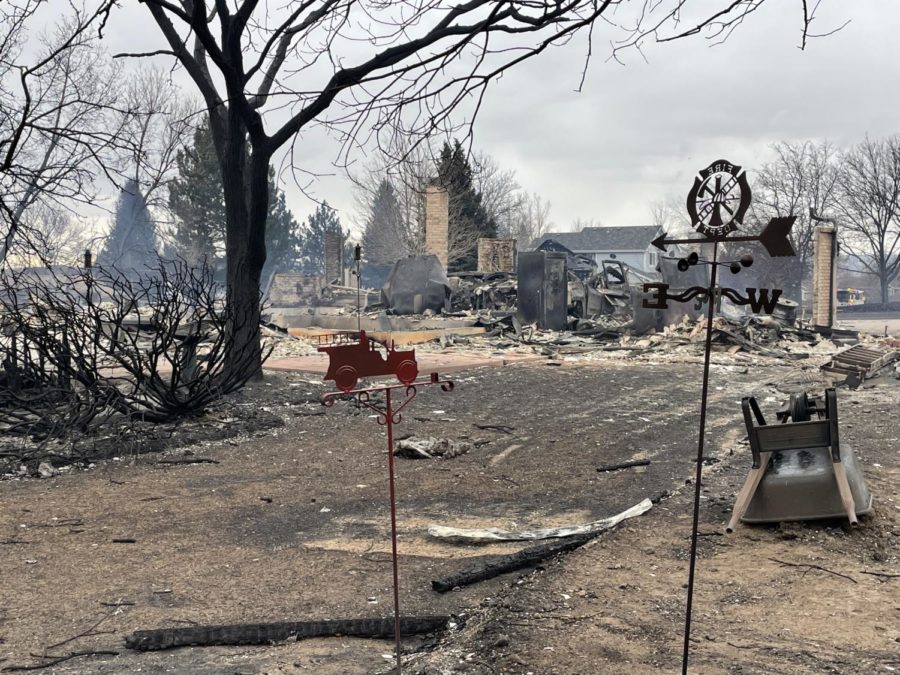STAFF EDITORIAL: Hitting too close to home
Marshall Fire direct result of worsening climate change
Coastal cities stand on the brink of flooding at all times. Devastating fires pile up on the shoulders of Mother Nature. The urgency of climate change inevitably comes across natural disaster reports, mainly due to global warming, at every waking hour. Climate change accelerates at full speed and echoes through extreme weather events.
Yet, the momentum of preserving our environment wears out despite increasing threats. People seem to have grown a shielding tolerance toward climate change.
They read the news, see a fire report, share their compassion, donate, at best, then occupy their minds with other ongoing events in a matter of seconds.
Out of sight, out of mind.
As destructive as these catastrophes are, they are thousands of miles away.
Until they aren’t anymore.
The Marshall Fire, a product of global warming, came and knocked on every single door in Boulder County and demanded our attention on December 30.
At barely a moment’s notice, the Marshall Fire quickly swept across the suburban neighborhoods of Louisville, Superior, and Boulder County with the aid of a hurricane-force wind.
Everyone in the affected cities and surrounding areas evacuated with fear and terror, worrying if their families and friends would be safe while driving through active fire zones teeming with smog and traffic.
Some stayed away for a few days. Many had no choice but to say goodbye to their homes while watching the flames from hotel TVs, Twitter feeds, and drone footage.
There were tears, exhaustion, frustration, and so much more. However, to those outside of our area, it’s just another fire.
Perhaps how many of us felt about the Dixie Fire in California, a vicious blaze that tore apart nearly a million acres of land in the summer of 2021.
The Dixie Fire burned land equivalent to the size of New York City, Chicago, Dallas, and Los Angeles combined. Both fires demonstrate how climate change aggravates a slight flame into an extremely destructive wildfire in a split second, leveling all structures and imprinting an irreversible kind of change.
The Marshall Fire stained our lives forever. Houses will take years to rebuild. People need time to heal their losses. And even now, with the fire faded away, global warming won’t. At least not during our lifetimes.
It’s undeniable that the Marshall Fire is the visible consequence of the rising temperature. Let’s face it, Colorado’s 2021 Christmas was far from a white one. In fact, there had been no snow on the ground for 232 consecutive days until December 10, 2021.
CPR news reports that during the second half of 2021, the state underwent one of the driest and warmest seasons, according to national weather data.
It’s no coincidence that the abnormal rise in temperature and lack of precipitation is followed up by the most destructive wildfire in the history of Colorado. If it wasn’t for these factors, the fire wouldn’t have spread as quickly or widely.
Each rise in temperature further pushes our world further into the climate crisis—a state of turbocharged fires, droughts, floods, and other natural disasters taking over our environment.
Despite substantial recognition of climate change, the actions and progress of preventing it are inconsistent. People return to using plastic straws after a few months of advocating for the reduction of marine pollution. They continue to support corporations that maintain weak remediation of waste and perpetuate the burden of greenhouse gas emissions.
Goals go unmet and projects go unaccomplished.
In 2020, Manhattan’s Union Square reset its digital clock as a countdown to the earth’s doomsday. At the time of writing this article, the world has five years, 326 days, one hour, 10 minutes and 30 seconds to reduce greenhouse gasses emission to zero before climate change becomes irreversible.
We are in the midst of a climate emergency.
The Marshall Fire serves as a glimpse into the bleak future we have created. An alarm to remind us to take consistent and immediate action to combat climate change before tipping points of unsustainable human activities shatter the earth.
It’s no longer a problem miles away when a fire’s orange glow reaches our own doormats. Let’s not hit snooze on the alarm of climate change.































